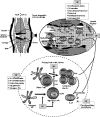Emerging roles of vasoactive intestinal peptide: a new approach for autoimmune therapy
- PMID: 17934101
- PMCID: PMC2095290
- DOI: 10.1136/ard.2007.078519
Emerging roles of vasoactive intestinal peptide: a new approach for autoimmune therapy
Abstract
Identification of the factors that regulate the immune tolerance and control the appearance of exacerbated inflammatory conditions is crucial for the development of new therapies of autoimmune diseases. Some neuropeptides and hormones have emerged as endogenous agents that participate in the regulation of the processes that ensure self-tolerance. Among them, the vasoactive intestinal peptide (VIP), a well-characterised endogenous anti-inflammatory neuropeptide, has shown therapeutic potential for a variety of immune disorders. Here we examine the latest research findings, which indicate that VIP participates in maintaining immune tolerance in two distinct ways: by regulating the balance between pro-inflammatory and anti-inflammatory factors, and by inducing the emergence of regulatory T cells with suppressive activity against autoreactive T cell effectors.
Conflict of interest statement
Competing interests: None declared.
References
-
- Firestein G S. Evolving concepts of rheumatoid arthritis. Nature 2003423356–361. - PubMed
-
- Mills K H G. Regulatory T cells: friend or foe in immunity to infection? Nat Rev Immunol 20044841–855. - PubMed
-
- Bluestone J A. Regulatory T‐cell therapy: is it ready for the clinic? Nat Rev Immunol 20055343–349. - PubMed
-
- Shevach E M. From vanilla to 28 flavors: multiple varieties of T regulatory cells. Immunity 200625195–201. - PubMed
Publication types
MeSH terms
Substances
LinkOut - more resources
Full Text Sources
Other Literature Sources
Medical


